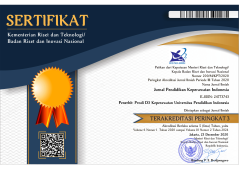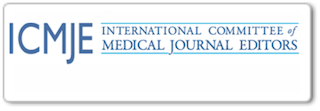Literasi Kesehatan Orang Dengan HIV/AIDS
Abstract
ABSTRAK
Literasi kesehatan merupakan kemampuan seseorang untuk mencari, memahami informasi kesehatan dalam menentukan keputusan bagi kesehatannya. Di Kabupaten Garut prevalensi kasus AIDS masih tinggi. Literasi kesehatan ini sangat penting untuk orang dengan HIV/AIDS (ODHA) karena sangat rentan terkena infeksi opportunistik apabila tidak dapat melakukan perawatan kesehatan, pencegahan penyakit dan promosi kesehatan, diharapkan ODHA dapat memenuhi kebutuhannya melalui informasi yang diperoleh guna meningkatkan derajat kesehatan. Penelitian ini bertujuan untuk mengetahui bagaimana gambaran literasi kesehatan orang dengan HIV/AIDS. Penelitian ini menggunakan desain deskriptif kuantitatif dan penarikan sampel menggunakan purposive sampling, sebanyak 60 responden. Instrumen pada penelitian ini menggunakan kuesioner Health Literacy Study-Asia (HLS-Asia) diadaptasi dari Health Literacy Study-European (HLS-EU) yang dikembangkan oleh Kristine Sorensen terdiri dari 40 pertanyaan dan sudah diuji validitas dengan hasil alpha cronbach 0.982 untuk mengukur literasi kesehatan yang dilaksanakan pada bulan Juni 2018 di Poliklinik Dahlia TNI-AD Tk. IV Garut. Hasil penelitian Responden memiliki literasi rendah (56.7%) lebih banyak dibandingkan dengan responden yang memiliki literasi tinggi (43.3%). Keempat komponen literasi kesehatan yang rendah di Poliklinik Dahlia dikarenakan responden masih kesulitan dalam menilai informasi (63.3%) dan menerapkan informasi kesehatan (61.7%). Perlunya bagi petugas kesehatan memberikan informasi secara jelas, sederhana dan menyediakan sarana dan prasarana bagi ODHA untuk memenuhi kebutuhan perawatan kesehatannya.
ABTRACT
Health literacy is an individual’s ability to find, understand and comprehend health information in determining decisions for their health. AIDS cases prevalence in Garut is still considered high. Health literacy is very important for those who live with HIV / AIDS (ODHA) because they are tend to be fragile toward opportunistic infections if they don’t get health treatment, disease prevention and health promotion. It is expected that ODHA can fulfill their needs by obtaining some health information in order to improve their health status. This study purpose is to find out the description of health literacy on people living with HIV / AIDS. This research used quantitative descriptive design and purposive sampling to take 60 respondents. The instrument used on this research are Health Literacy Study-Asia (HLS-Asia) questionnaire that is adapted from the Literacy Study-European (HLS-EU), wich developed by Kristine Sorensen. It consist of 40 questions and its validity has been tested with the results of alpha cronbach 0.982 to measure health literacy that conducted on June 2018 at the Dahlia Polyclinic of TNI-AD, Tk. IV Garut. Results this research Respondents who have lower literacy (56.7%) more than respondents who had high literacy (43.3%). The four components of low health literacy in Dahlia Polyclinic are the respondents’ difficulty to assess the information (63.3%) and to apply health information (61.7%). Hence, the health workers need to give ODHA simple health information clearly and provide facility for fulfilling their health treatment needs.
Keywords
Full Text:
PDFReferences
Berens, E. M., Vogt, D., Messer, M., Hurrelmann, K., & Schaeffer, D. (2016). Health literacy among different age groups in Germany: results of a cross-sectional survey. BMC public health, 16(1), 1151.
Berkman, N. D., Sheridan, S. L., Donahue, K. E., Halpern, D. J., & Crotty, K. (2011). Low health literacy and health outcomes: an updated systematic review. Annals of internal medicine, 155(2), 97-107.
Bidang P2P (2017) Laporan Program Pencegahan Dan Penanggulangan Penyakit Menular. Dinas Kesehatan Kabupaten Garut
Buvinic, M., Médici, A., Fernández, E., & Torres, A. C. (2006). Gender differentials in health. Disease control priorities in developing countries, 2, 195-210.
Caiola, C., Barroso, J., & Docherty, S. L. (2018). Black Mothers Living With HIV Picture the Social Determinants of Health. Journal of the Association of Nurses in AIDS Care, 29(2), 204-219.
Ciampa, P. J., Vaz, L. M., Blevins, M., Sidat, M., Rothman, R. L., Vermund, S. H., & Vergara, A. E. (2012). The association among literacy, numeracy, HIV knowledge and health-seeking behavior: a population-based survey of women in rural Mozambique. PLoS One, 7(6), e39391.
Dawson-Rose, C., Cuca, Y. P., Webel, A. R., Báez, S. S. S., Holzemer, W. L., Rivero-Méndez, M., & Reyes, D. (2016). Building trust and relationships between patients and providers: An essential complement to health literacy in HIV care. Journal of the Association of Nurses in AIDS Care, 27(5), 574-584
Dinas Pendidikan Pemkab Garut, (2017). Profil Dinas Pendidikan Kabupaten Garut. bappeda.garutkab.go.id (diakses di pada tanggal 20 mei 2018).
Duong, T. V., Aringazina, A., Baisunova, G., Pham, T. V., Pham, K. M., Truong, T. Q., & Huang, H. L. (2017). Measuring health literacy in Asia: Validation of the HLS-EU-Q47 survey tool in six Asian countries. Journal of epidemiology, 27(2), 80-86.
Fagnano, M., Halterman, J. S., Conn, K. M., & Shone, L. P. (2012). Health literacy and sources of health information for caregivers of urban children with asthma. Clinical pediatrics, 51(3), 267-273.
Hermanus, A. & Asdie, A. H. (2011). Perilaku Dan Risiko Penyakit Hiv-Aids Di Masyarakat Papua Studi Pengembangan Model Lokal (Doctoral dissertation, Universitas Gadjah Mada).19
http://dx.doi.org/10.1186/1471-2458-13-948.
Ishikawa, H., Kiuchi, T. (2010). Health Literacy and Health Communication. BioPsychoSosical Medicine, 4(18),1-5
Jamil, K. F. (2014). Profil kadar CD4 terhadap infeksi oportunistik pada penderita human immunodeficiency virus/acquired immunodeficiency syndrome (HIV/AIDS) di RSUD dr. Zainoel Abidin Banda Aceh. Jurnal Kedokteran Syiah Kuala, 14(2), 76-80.
Kalichman, S. C., Benotsch, E., Suarez, T., Catz, S., Miller, J., & Rompa, D. (2000). Health literacy and health-related knowledge among persons living with HIV/AIDS. American journal of preventive medicine, 18(4), 325-331.
Kemenkes, RI. (2014). Situasi dan Analisis HIV AIDS. Kemenkes RI. Jakarta; 2014.
Kemenkes, RI. (2015). Pedoman Pelaksanaan Pencegahan Penularan HIV dan Sifilis dari Ibu ke Anak Bagi Tenaga Kesehatan
Kemenkes, RI. (2017). Laporan Situasi Perkembangan HIV/AIDS & PIMS di Indonesia Januari-Maret http://siha.depkes.go.id/portal/files_upload/Laporan_HIV_AIDS_TW_1_2017_rev.pdf (di akses pada tanggal 13 Maret 2017)
Kowalak, J, P., Welsh, W., Mayer, B. (2011). Buku Ajar Patofisiologi. Alih bahasa oleh Andry Hartono. Jakarta: EGC
Kutner M, Greenberg E, Jin Y, Paulsen C. (2006). The health literacy of america’s adults: Results from the 2003 national assessment of adult literacy (NCES 2006–483) In: Education USDoE. Washington, DC: National Center for Education Statistics. 2006.
Lee, S. Y. D., Tsai, T. I., Tsai, Y. W., & Kuo, K. N. (2010). Health literacy, health status, and healthcare utilization of Taiwanese adults: results from a national survey. BMC public health, 10(1), 614.
Liu, Y. B., Liu, L., Li, Y. F., & Chen, Y. L. (2015). Relationship between health literacy, health-related behaviors and health status: A survey of elderly Chinese. International journal of environmental research and public health, 12(8), 9714-9725.
Mayagah kaj and wayne mitic, (2009), promoting health and development: closing the implementation GAp, Nairobi Kenya, p9-46
Murni. S., Green. W. C., Djauzi. S., Setiyabto. A., Okta. S. (2009). Hidup dengan HIV/AIDS. Jakarta: Yayasan Spiritia
Ng, E., Omariba, DW. (2010). Health Literacy and Immigrants in Canada: Determinant and Effect on Health Outcomes, Canadian Council on Learning, Canada.
Nielsen-Bohlman, L. (Eds.). (2004). Health literacy: a prescription to end confusion. National Academies Press.
noncommunicable_diseases/en/
Notoatmodjo, S. (2010). Konsep Perilaku Kesehatan Dalam: Promosi Kesehatan Teori & Aplikasi edisi revisi.
Nursalam, M. (2014). Metodelogi Penelitian Ilmu Keperawatan: Pendekatan Praktis Edisi 3. Jakarta: Salemda Medika
Nursalam. (2008). Konsep Penerapan Metodelogi Penelitiam Ilmu Keperawatan Pedoman Skripsi, Tesis, dan Instrumen Penelitian Keperawatan. Jakarta: Salemba Medika
Osborne, H. 2013. Health Literacy From A To Z : Practical Ways To Communicate Your Health Message. (edisi 2). USA: jones & bartlett learning
Ozdemir, H., Alper, Z., Uncu, Y., & Bilgel, N. (2010). Health literacy among adults: a study from Turkey. Health education research, 25(3), 464-477.
Padila, (2012). Buku ajar: Keperawatan Medikal Bedah. Yogyakarta: Nuha Medika
Porter, M. E. (2010). What is value in health care?. New England Journal of Medicine, 363(26), 2247-2481 http//:www.nejm.org/doi/full/10.1056/nejmp1011024
Reisi, M., Javadzade, S. H., Mostafavi, F., Sharifirad, G., Radjati, F., & Hasanzade, A. (2012). Relationship between health literacy, health status, and healthy behaviors among older adults in Isfahan, Iran. Journal of Education and Health Promotion, 1(1), 31.
Rootman, I., & Gordon-El-Bihbety, D. (2008). A vision for a health literate Canada. Ottawa, ON: Canadian Public Health Association.
Roshdal, C. B., Kowalski, M. T. (2014). Buku Ajar Keperawatan Dasar. Buku Kedokteran EGC: Jakarta
Saepudin, E. (2013). Literasi Informasi Kesehatan Lingkungan Pada Masyarakat Pedesaan: Studi Deskripstif Di Desa NAgrog Kecamatan Cicalengka, jurnal kajian informasi & perpustakaan, 2013, 1.1:81-90
Santosa, K. S. (2012). Faktor–Faktor yang Berhubungan dengan Tingkat Kemelekan Kesehatan Pasien Klinik Dokter Keluarga Fakultas Kedokteran Universitas Indonesia Kiara. Universitas Indonesia. Jakarta.
Sari, R. K. (2013). Literasi Informasi pada Pasien Penyakit Kronis (HIV/AIDS) di RSUD Dr. Soetomo Surabaya (Doctoral dissertation, UNIVERSITAS AIRLANGGA).
Septiyanto, T. (2017) Materi pokok Literasi Informasi. (cetakan kelima edisi 1) Tanggerang Selatan: Universitas Terbuka
Shah, L, C., West, P., Bremmeyr, K & Savoy-Moore, R. T. (2010) Health Literacy Instrument in Family medicine: The “Newest Vital Sign” Ease of Use and correlates. J Am Board Fam Med, 23, 195-203.
Shipman, J. P., Kurtz-Rossi, S., & Funk, C. J. (2009). The health information literacy research project. Journal of the Medical Library Association: JMLA, 97(4), 293. http://doi.org/10.3163/1536-5050.97.4.014
Singleton, K., Krause, E. (2009). Understanding Cultural and linguistic Barriers to Health Literacy. The online journal of issues in Nursing. 14(3). http://www.nursingworld.org
Sørensen, K., Van den Broucke, S., Fullam, J., Doyle, G., Pelikan, J., Slonska, Z., & Brand, H. (2012). Health literacy and public health: a systematic review and integration of definitions and models. BMC public health, 12(1), 80.
Sørensen, K., Van, d. B., Pelikan, J., Fullam, J., Doyle, G., Slonska, Z., Brand, H. (2013). Measuring health literacy in populations: Illuminating the design and development process of the european health literacy survey questionnaire (HLS-EU-Q). BMC Public Health, 13, 948.
Stolley, K. S., Glass, J. E. (2009). HIV/AIDS Health and medical issues today. California: ABC-CLIO, 2009.
Stonbraker, S., Smaldone, A., Luft, H., Cushman, L. F., Lerebours Nadal, L., Halpern, M., & Larson, E. (2017). Associations between health literacy, HIV‐related knowledge, and information behavior among persons living with HIV in the Dominican Republic. Public Health Nursing.
Thompson, J., Havenga, Y., & Naude, S. (2015). The health literacy needs of women living with HIV/AIDS. Health SA Gesondheid, 20(1), 11-21.
White, S. (2008). Assessing the nation's health literacy: Key concepts and findings of the National Assessment of Adult Literacy (NAAL). AMA Foundation.
World Health Organization, 2013 (http://www.who.int/features/factfiles/
World Health Organization, HIV/AIDS http://www.who.int/gho/hiv/en/
World Health Organization. 10 facts on noncommunicable diseases,
Zukoski, A. P., Thorburn, S., & Stroud, J. (2011). Seeking information about HIV/AIDS: a qualitative study of health literacy among people living with HIV/AIDS in a low prevalence context. AIDS care, 23(11), 1505-1508.
DOI: https://doi.org/10.17509/jpki.v5i1.15533
Refbacks
- There are currently no refbacks.
Jurnal Pendidikan Keperawatan Indonesia(JPKI) published by Indonesia University of Education. JPKI is licensed under a Creative Commons Attribution-ShareAlike 4.0 International License.
Office :
Nursing Department. FPOK UPI.
229, Dr. Setiabudhi Street. Bandung 40154
West Java , Indonesia
E-mail : jpki@upi.edu

_.png)
_.png)
_.png)











